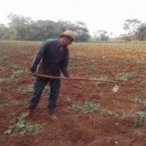English · Español

30 de enero de 2017 | Entrevistas
Paraguay: interview with Adriano Muñoz of the Latin American Agroecological Institute (IALA)
Descargar: MP3 (2.5 MB)
In an interview with the Radio Production Center “Ñane Ñe’ê-Beto Centurión” – DEMOINFO of Paraguay, agroecologist and member of the Northern Peasant Organization (OCN), Adriano Muñoz, talked about the current situation of peasants in Paraguay, their challenges, proposals and resistance strategies.
He said that peasant agriculture is currently a key issue linked with territorial conflicts and with two marked sides: on the one hand, the work carried out by peasant farmers and on the other the peasantless farming of agribusiness. This conflict is seen not only in Paraguay, but in Latin America as a whole, where multinational companies are rapidly displacing peasant farming in an hegemonic way. They invade territories and eliminate the resistance-based peasant identity, he said.
He added that Paraguay is undergoing a critical moment as only 40% of the people live in the countryside, a number that is rapidly dropping.
The role of peasant organizations is to resist in their territories by developing a model opposed to agribusiness, which is agroecology, saving the way of living and the experiences of indigenous and peasant communities.
Muñoz made specific reference to the need for small farmers to disregard agribusiness and avoid using poisons or heavy machinery on their lands. The counterproposal is to strengthen native seeds, preserve the soils and improve agricultural planning practices, he said.
The capitalist system´s greatest enemy is the peasant identity, since peasants develop their own economic model, they are not part of consumerist practices because they don´t buy anything they don´t need. The capitalist model is imposing a type of culture that aims to make the peasant communities disappear.
About this, the agroecologist highlights the need for the people of the countryside to organize themselves, to resist and to strengthen each other so as to not depend on the chemical input offered by companies. Agroecology does not depend on external factors, but on peasant knowledge itself, he highlighted.
In Concepción department, there are extremely valuable experiences around agroecology. Peasants focused on agroecology increase their yield by diversifying their production, which is enough for their daily sustenance and to make a profit. On the contrary, those who depend on monocrops don´t enjoy this possibility since they depend on external factors.
Agroecology supplies the local market, farmers share their products in the cities and this provides an extremely important income to peasant families. Consumers are becoming more and more aware of the importance to purchase healthy and wholesome food. This is an economically viable proposal and even a matter of ethics.
Agroecology is an economically viable proposal, it is ethical and socially fair, said Muñoz, making reference to the challenges faced by peasant organizations to keep fighting for their lands, producing organically, promoting agricultural production by young people and having access to the market, considering that in Paraguay there isn´t a serious public policy that prioritizes peasant agriculture.
Imagen: http://demoinfo.com.py/








